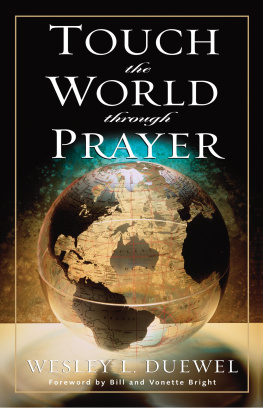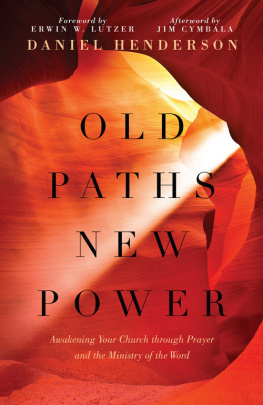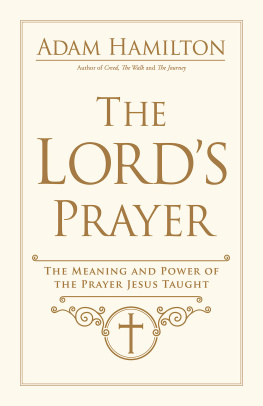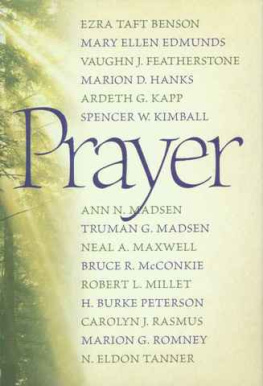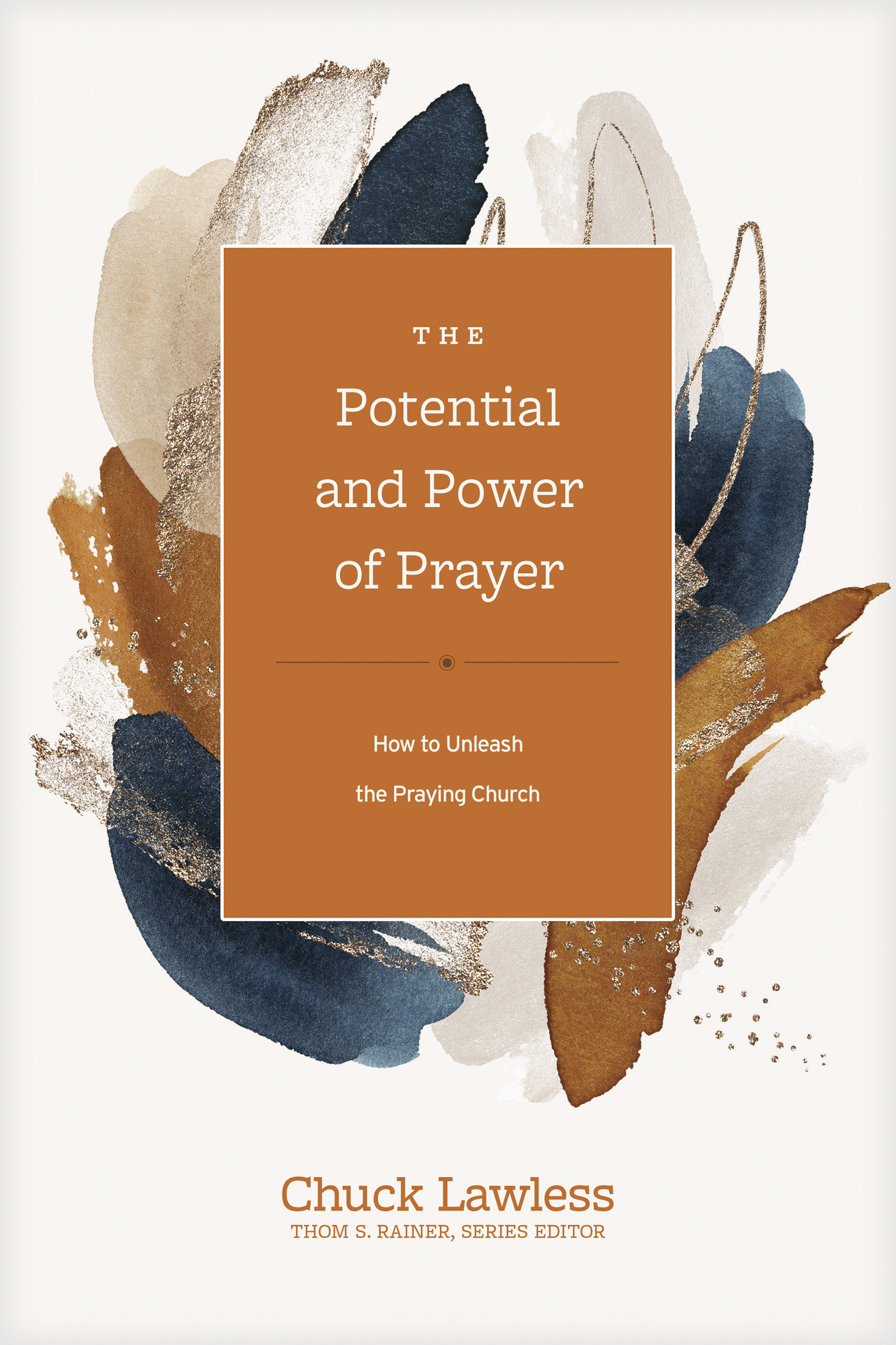Visit Tyndale online at tyndale.com.
Visit Tyndale Momentum online at tyndalemomentum.com.
Tyndale, Tyndales quill logo, Tyndale Momentum, and the Tyndale Momentum logo are registered trademarks of Tyndale House Ministries. Tyndale Momentum is a nonfiction imprint of Tyndale House Publishers, Carol Stream, Illinois.
The Potential and Power of Prayer: How to Unleash the Praying Church
Copyright 2022 by Church Answers. All rights reserved.
Cover photograph of art abstract copyright Veris Studio/Creative Market. All rights reserved.
Interior illustration of distribution chart copyright Furian/Depositphotos. All rights reserved.
Designed by Ron C. Kaufmann
All Scripture quotations, unless otherwise indicated, are taken from the Holy Bible, New Living Translation, copyright 1996, 2004, 2015 by Tyndale House Foundation. Used by permission of Tyndale House Publishers, Carol Stream, Illinois 60188. All rights reserved.
Scripture quotations marked ESV are from The ESV Bible (The Holy Bible, English Standard Version), copyright 2001 by Crossway, a publishing ministry of Good News Publishers. Used by permission. All rights reserved.
Scripture quotations marked NIV are taken from the Holy Bible, New International Version, NIV. Copyright 1973, 1978, 1984, 2011 by Biblica, Inc. Used by permission. All rights reserved worldwide.
Scripture quotations marked NRSV are taken from the New Revised Standard Version Bible, copyright 1989, Division of Christian Education of the National Council of the Churches of Christ in the United States of America. Used by permission. All rights reserved.
For information about special discounts for bulk purchases, please contact Tyndale House Publishers at , or call 1-855-277-9400.
Library of Congress Cataloging-in-Publication Data
A catalog record for this book is available from the Library of Congress.
ISBN 978-1-4964-6200-8
ISBN 978-1-4964-6202-2 (ePub); ISBN 978-1-4964-6201-5 (Kindle); ISBN 978-1-4964-6203-9 (Apple)
Build: 2022-06-03 11:43:23 EPUB 3.0
To Pam,
my bride, my friend, my prayer partner.
To Danny Akin,
president of the Southeastern Baptist Theological Seminary,
who has led our seminary to be a praying institution.
To Jeremy,
my administrative assistant and friend,
who prayed for me, protected my time, and served as editor to make this work possible.
: Why No Power?
I STARTED MY FIRST pastorate when I was twenty years old. As you might imagine, I had no idea what I was doing. That small country church knew me through one of their previous pastors, and I suspect I was the best they could afford at the time. The nineteen people who made up the congregation that first Sunday could hardly pay anything close to a full-time salary, but I was willing to take anything for the opportunity to preach.
I had become a believer at the age of thirteen, and I faithfully attended church. But attendance didnt mean I was strongly or intentionally discipled. I did the best I could to walk with Christ, but with very little equipping for the task. Still, I was certain that God was calling me to preach, and the invitation from that little church in southwestern Ohio lit my fire for ministry.
I wish I could say that the lay leaders in that church were thoroughly equipped and ready to help their young, rookie pastor do his job, but that was not the case. They were great people who loved the Lord, but no one had intentionally discipled most of them, either. In many respects, I was a baby believer leading other baby believers. And though most of the congregation was older than I was, they didnt know much more than I did about following Jesus.
However, there were three things we knew we had to do: preach the Bible, tell others about Jesus, and pray. I cringe to think about my sermons in those days; in fact, Im glad I preached them at a time when cassette tapes were state of the art rather than internet streaming. Still, I was convinced I needed to preach the Word, and I did the best I could. The church members were gracious enough to affirm my preaching even as they prayed for me to improve.
Those same members, despite their own lack of training, loved telling others about Jesus. They told their family members, their coworkers, their neighbors, their classmates, and anyone else who would listen (and, Im certain, some folks who did not want to listen). Every Sunday, they told me stories about evangelizing people in our community, and our church began to grow. Week after week, we had the privilege of baptizing new believers. Within two years, our little church of nineteen saw more than one hundred baptisms of new Christ-followers. I found it especially exciting that many of these new believers were parents, grandparents, children, grandchildren, and cousins of our church members. So productive were our evangelism efforts that we grieved as a congregation if a week passed without someone coming to Christ.
How did we get there? We prayed. A lot. Together and individually. Passionately and persistently. Faithfully and fiercely. We prayed because we didnt know what else to do. And God blessed our efforts.
The Motive behind Our Prayers
Looking back, I realize that we prayed for at least four reasons.
First, we were desperate for God to do something among us and through us. The church had been through tough times for several years prior to my coming as pastor. The congregation of nineteen people had once listed more than a hundred regular attenders, but strife and division had decimated the church. We knew that only Gods intervention would enable us to survive and thrive. Desperation is a good thing when it drives us to our knees before our heavenly Father.
Second, we realized we had no idea what we were doing as a church. I certainly did not and I was the pastor! I had never performed a baptism, led the Lords Supper, offered premarital or marital counseling, created a church budget, or moderated a business meeting. So I prayed. The few remaining members were wearing many hats, tackling multiple responsibilities, and giving their all to tasks for which they were not always gifted. So they prayed. Just like desperation, recognizing our inability pushes us to pray.
Third, we wanted our loved ones and friends to get saved, but we knew we could never change their hearts on our own. We didnt spend much time thinking theologically about their separation from God, yet we knew from experience the hardened hearts of some of the people we loved. We knew them well enough to know that God would have to intervene if they were ever to respond to the gospel. In some cases, we knew how many times in the past they had refused to even listen. So we prayed. And we kept praying until God answered. Like desperation and inability, a deep burden for nonbelievers compels us to pray.
Fourth, prayer was something that every member of our church family could do. Men prayed together. Women prayed together. Men and women prayed together. Young believers who knew nothing about prayer talked to God the best they knew how. In fact, their passion for God sometimes exceeded that of others in the church who had been believers far longer. Teenagers prayed, sometimes challenging their parents with their heartbrokenness for nonbelieving classmates and friends. Even the young kids prayed at times and there is nothing like hearing a preschooler or a grade schooler talk to God with childlike openness and honesty. In our congregation, kneeling in prayer (literally and figuratively) put us all on the same level, regardless of our status in the community or in the church. Praying together made us even more like a family.




